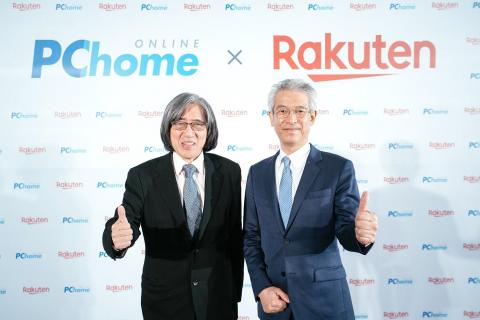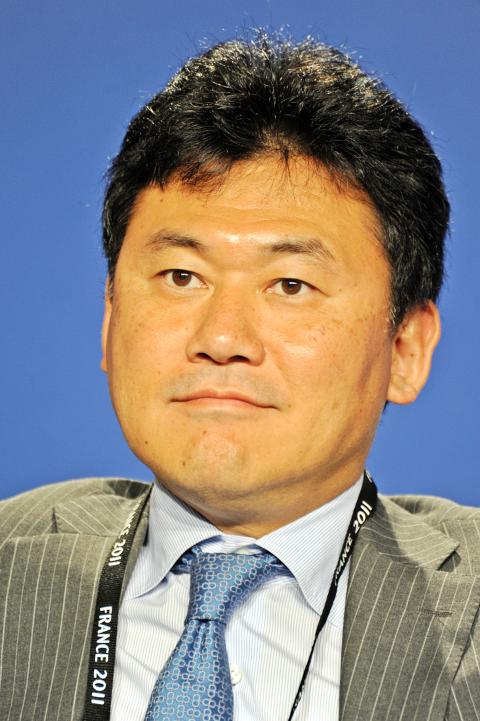Direct delivery from Japan and cross-border trade between Taiwan and Japan has just become a whole lot easier. Japanese e-commerce firm Rakuten Inc and Taiwanese e-commerce operator PChome Online Inc have signed a cooperation agreement to pool their respective membership bases and services. This will enable the establishment of a unified reward system, which will combine PChome’s "PPoint" and Rakuten’s “Super Points,” allowing customers to accumulate and redeem reward points using a single system. Under the agreement, cross-border trade will be expanded to promote a Taiwan-Japan strategic alliance.
According to PChomestore chairman Jan Hung-tze, he established the e-commerce Web site pcstore.com.tw in 2004, several years before China’s Tmall, having observed the Rakuten model for a period of five years. Jan says the Web site has a 10 million-strong member base in Taiwan and has been looking to expand overseas. President of Rakuten’s Asia operations, Hiroshi Takasawa, says Taiwan is an extremely important market for the company.
Rakuten and PChomestore started collaborating six months ago by allowing PChome’s “PPoint” and Rakuten’s “Super Points” to be accumulated and used together, and expanding e-commerce trade between Taiwan and Japan. This means that Taiwanese customers can use the ruten.com Web site to get a taste of what is currently trending in Japan and, through a Chinese-language interface, purchase items using their local currency. The system also allows Taiwanese customers to enjoy direct shipping from Japan, in addition to other Rakuten e-commerce services.

Photo courtesy of PChome
照片:網家提供
Benefits provided by Rakuten’s Taiwan credit card can be accumulated when making purchases on the PChome Web site, and PChome will make Rakuten’s Kobo e-Reader available on its PChome24h Web site and provide a nationwide, 24hr delivery service. Rakuten and PChome will also team up their logistics operations in Taiwan.
PChome’s Jan says he feels an affinity toward Rakuten’s business model and opened negotiations with the company in 2009 to discuss possible areas for collaboration. Jan traveled to Japan to meet with Rakuten’s founder Hiroshi Mikitani, but at the time the overall terms of the agreement were not fully hammered out. However, in light of Rakuten’s ever-expanding range of services, both sides have now agreed to embark upon an initial phase of collaboration, combining their respective membership bases and reward schemes.
Once the two companies formalize their collaboration, it will be possible for Japanese goods to be directly shipped to Taiwan by Rakuten shop owners in Japan, making cross-border trade much simpler.

Photo courtesy of Rakuten
照片:樂天提供
(Translated by Edward Jones, Taipei Times)
日貨直送,台日跨境交易變簡單了。日本樂天集團已與PChome網路家庭簽訂合作協議,利用雙方會員數和服務,進一步建立P幣和樂天超級點數互相累積和兌換機制,衝點數經濟,也將同步擴展台日跨境線上交易,推動台日策略聯盟。
網家董事長詹宏志強調,他在觀察樂天模式五年後,二○○四年成立商店街,幾年後中國的天貓才成立。網家在台有千萬會員,盼服務跨出台灣。日本樂天集團亞洲區總裁高澤廣志表示,台灣對樂天來說,是一個非常重要的市場。

Photo: Wikimedia Commons
照片:維基共享資源
樂天與網家是在六個月前開啟此次合作,PChome的P幣與樂天的樂天超級點數可相互累積使用,也將同步擴展台日之間的跨境線上交易,台灣消費者將可透過露天拍賣網站,體驗與日本同步流行、中文介面購買、在地金流、日本直送等跨境電商服務。
此外,台灣樂天信用卡優惠將同步在PChome的購物網站上使用,PChome也將在PChome24h購物銷售樂天的Kobo電子書閱讀器,並提供全台保證二十四小時送貨服務,樂天在台的物流也會跟網家合作。
詹宏志表示,他對樂天模式情有獨鍾,二○○九年就跟樂天談過合作,也去日本見了樂天創辦人三木谷浩史,但當時整體條件沒有那麼完備;隨著樂天有越來越多服務,雙方第一階段先把會員跟點數串接起來。
網家與樂天合作後,未來日貨會從日本店家直送台灣,跨境交易將變得更簡單。
(自由時報記者廖千瑩)
FOLLOW UP
課後練習
1. Japanese e-commerce firm Rakuten Inc’s founder, Hiroshi Takasawa, held a joint news conference with Taiwan’s PChome Online Inc last month in Taipei.
2. PChome Online and Rakuten will integrate their respective reward point systems starting from next month.
3. PChome has a 10,000-strong customer base in Taiwan.
4. Under the agreement, PChome will begin selling Rakuten’s Kobo e-Reader on its Web site.
5. Under the agreement Rakuten will allow direct shipping to Taiwan of products sold on its Japanese Web site.
(Edward Jones, Taipei Times)

A: The 23rd Taiwan Pride parade will be marching again on Saturday, Oct. 25. B: Will the parade kick off from Taipei City Hall Plaza as usual? A: Yup, and there will be over 110 LGBT-themed booths at the Rainbow Festival in the plaza. B: The organizer is reportedly teaming up with Japanese, South Korean and other international groups. A: So we are likely to see more foreign visitors from across the world. Hopefully, this year’s parade can smash the record of 200,000 marchers set in 2019. A: 第 23 屆台灣同志遊行本週六即將登場。 B: 遊行還是從台北市政府前廣場出發嗎? A: 對,廣場「彩虹市集」還有超過

A: As the Taiwan Pride parade enters its 23rd year, the nation also celebrates the sixth anniversary of the legalization of same-sex marriage. B: However, a poll showed that support for same-sex marriage slightly dropped to 54.3 percent from last year’s 56.5 percent. A: The government is wavering on whether to extend the Assisted Reproduction Act to same-sex couples, leading to public doubts. B: Since US President Donald Trump took office in January, his oppression of Diversity, Equity and Inclusion (DEI) programs has also frustrated the global LGBT community. A: Let’s join the parade in Taipei tomorrow to

California will phase out certain ultra-processed foods from school meals over the next decade under a first-in-the-nation law signed on Oct. 8 by Gov. Gavin Newsom. The law seeks to define ultra-processed foods, the often super-tasty products typically full of sugar, salt and unhealthy fats. The legislation requires the state’s Department of Public Health to adopt rules by mid-2028 defining “ultra-processed foods of concern” and “restricted school foods.” Schools have to start phasing out those foods by July 2029, and districts will be barred from selling them for breakfast or lunch by July 2035. Vendors will be banned from providing the “foods

Have you ever bought a new smartphone and suddenly found yourself dissatisfied with your perfectly fine headphones? Before long, you’ve purchased premium wireless earbuds, a protective case and a fast-charging station. What begins as a single acquisition snowballs into a shopping spree—this is the Diderot effect in action. Named after the 18th-century French philosopher Denis Diderot, the Diderot effect originates from an essay he wrote. In it, he recounted receiving a luxurious robe as a gift. As lovely as it was, the robe clashed with the rest of his humble belongings. One by one, he replaced his possessions to match the